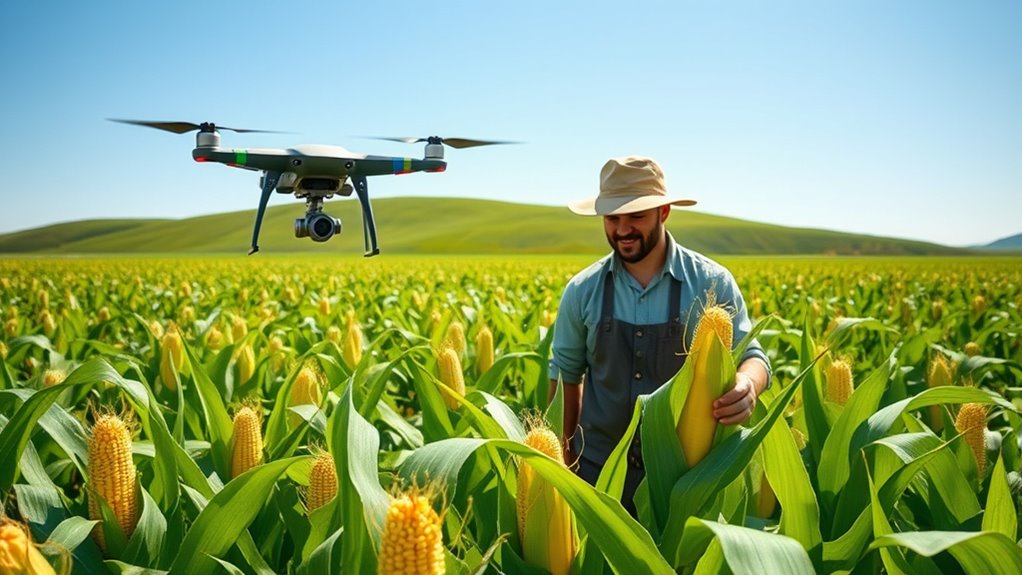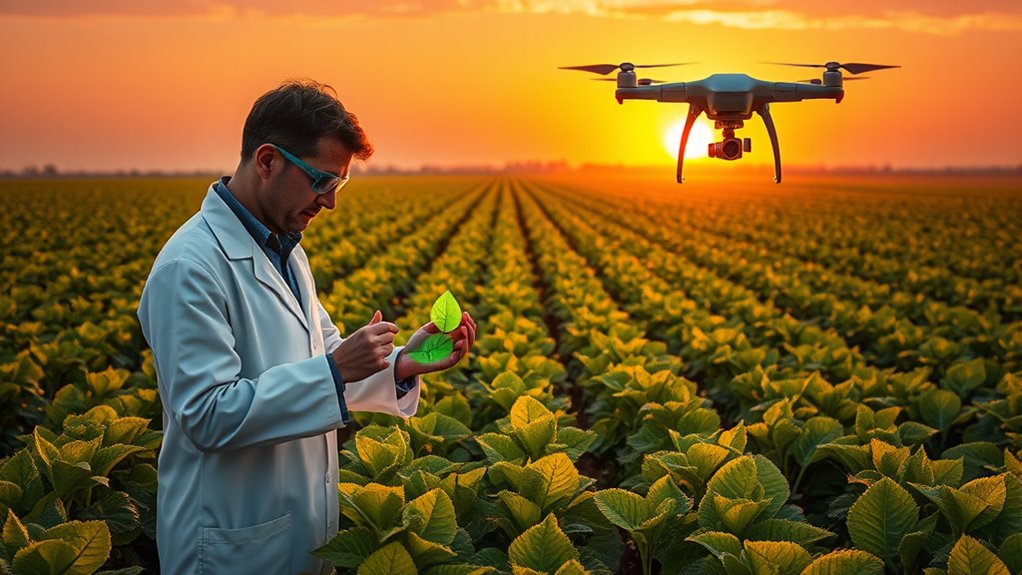Biotechnology in agriculture’s transforming how we grow food. It boosts crop resilience, making them stronger against pests and climate change. You’ll find nutrient-rich crops, like Golden Rice, tackling health issues in communities. With reduced reliance on harmful pesticides, the environment benefits too. Innovative farming practices enhance productivity while conserving resources. This approach is key to feeding a growing global population. Stick around to discover how these advancements can shape the future of food security.
Key Takeaways
- Biotechnology increases crop yields and resilience, allowing farmers to produce more food with fewer resources.
- Nutrient-enriched crops, like Golden Rice, combat nutritional deficiencies in vulnerable populations.
- Biotech innovations develop drought-resistant crops, aiding adaptation to climate change and ensuring food security.
- Reduced reliance on chemical pesticides enhances environmental sustainability and promotes healthier ecosystems.
- Public education and transparent communication are crucial for improving trust and acceptance of biotechnology in agriculture.

Have you ever wondered how biotechnology is transforming agriculture? It’s a fascinating field that’s reshaping how we grow food, manage crops, and tackle some of the biggest challenges facing farmers today. With the global population on the rise, the pressure to produce more food in sustainable ways has never been greater. Biotech innovations, like genetically modified organisms (GMOs) and advanced breeding techniques, are helping farmers meet this challenge head-on.
Imagine walking through a field of corn that’s been engineered to resist pests and diseases. You’d see healthier plants, which means higher yields for farmers. These biotechnological advancements reduce the need for chemical pesticides, making farming not only more productive but also more environmentally friendly. You might even be surprised to learn that many of the foods you enjoy—like tomatoes and soybeans—are products of biotech. By making crops more resilient, farmers can produce more food with fewer resources.
Biotechnology is revolutionizing agriculture, enabling healthier crops and higher yields while reducing reliance on chemical pesticides.
Biotechnology also plays a vital role in improving crop nutrition. You might have heard of “Golden Rice,” a variety enriched with Vitamin A. This rice is designed to combat deficiencies prevalent in many parts of the world, especially in developing countries. By using biotech, you’re not just producing food; you’re also addressing health issues and saving lives. It’s a powerful example of how science can create solutions that benefit both people and the planet.
But let’s not forget about sustainability. As climate change poses new challenges, biotechnological tools are helping farmers adapt to extreme weather conditions. For instance, drought-resistant crops can survive with less water, ensuring that farmers in arid regions can still grow food. You’ll find that these innovations not only help secure food supplies but also protect precious natural resources. Additionally, these advancements are crucial for lucid dreaming and enhancing farmer creativity through problem-solving in challenging environments.
You may be wondering about the concerns surrounding biotechnology. While it’s true that public perception varies, ongoing research and transparent communication are key to addressing these issues. Engaging with the community and ensuring that consumers understand the benefits can help build trust. It’s essential for everyone involved—farmers, scientists, and consumers—to work together toward a common goal.
Frequently Asked Questions
What Are the Environmental Impacts of Biotech Crops?
Biotech crops can have both positive and negative environmental impacts. They often reduce the need for chemical pesticides, which can lead to healthier ecosystems. However, increased herbicide use may harm biodiversity and create resistant weed species. You might also see improvements in soil health and reduced greenhouse gas emissions from lower tillage practices. Overall, the effects largely depend on specific practices and local ecosystems, so it’s essential to evaluate the context.
How Do Biotech Crops Affect Biodiversity?
Biotech crops can be like a double-edged sword, swinging wildly in the biodiversity arena. On one hand, they can boost crop yields and reduce pesticide use, which might help preserve surrounding ecosystems. On the other hand, they could outcompete native plants or create superweeds, tipping the balance of nature. When you’re growing biotech crops, it’s essential to monitor these effects, ensuring you promote a healthy, diverse environment alongside agricultural advancements.
Are Biotech Foods Safe for Human Consumption?
Yes, biotech foods are generally considered safe for human consumption. Regulatory agencies, like the FDA and WHO, thoroughly assess these foods for safety before they hit the market. Studies show no significant differences in health risks between biotech and conventional foods. However, it’s always smart to stay informed and consult reliable sources about the specific products you consume. Trusting scientific consensus can help you make confident choices about what you eat.
What Regulations Govern Biotech Agriculture?
In the U.S., the USDA, FDA, and EPA regulate biotech agriculture. The USDA oversees the environmental impact of genetically engineered crops, while the FDA ensures food safety and labeling. The EPA evaluates the pesticide use and potential risks to human health and the environment. You’ll find that these agencies work together to create a detailed regulatory framework, helping to ensure that biotech products are safe for consumers and the environment alike.
How Do Farmers Access Biotech Seeds?
To get biotech seeds, you’ll want to do your homework and connect with reputable seed suppliers. Many farmers buy directly from companies that specialize in biotech crops. You can also attend agricultural expos or workshops, where you’ll meet representatives and learn about new varieties. Don’t forget to check for local regulations, as some areas have restrictions. Getting the right seeds is essential, so always ask questions and seek advice from experienced growers.
Conclusion
As we stand at the crossroads of innovation and tradition, biotech in agriculture offers a bright path to feeding the future. Embracing these advancements isn’t just about crops; it’s about cultivating sustainability and resilience in the face of global challenges. By harnessing the power of biotechnology, you’re not just planting seeds—you’re sowing hope for generations to come. So let’s dig in and nurture this potential, ensuring that everyone has a seat at the table.









